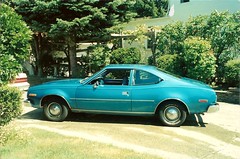
The historic presidential election, which will be determined tomorrow between Senator Barack Obama (Illinois) and Senator John McCain (Arizona), contains a little discussed aspect by the media. One of the candidates, Senator Obama, has made his case to the American people not only with a set of policies but a conception of history as well. According to Mr. Obama, America has attained greatness thorough its idealism and ability to conquer great crises with a unique and indomitable spirit. On the trail in search for voters, he often cites the American Revolution, the campaigns for women's and African-American rights, World War I, the Great Depression and World War II as once seemingly insurmountable obstacles overcome by the grit and determination of a strong and free people. As a result, tens of millions of Americans have gravitated to his quest for the presidency. Senator Obama is ultimately correct, and even a cursory review of American history is bound to convince the most pessimistic critic that the United States been a force for historical 'change we can believe in.'
.
The Declaration of Independence, 4 July 1776
.
After years of 'taxation without representation' and bearing the brunt of British military occupation, a band of colonists, which included Northern beer brewers and Southern gentry, decided to break from the greatest Empire in history since Rome. Rather than from the top-down, the colonists, who had begun to call themselves 'Americans', issued a 'shot heard around then world' with the Declaration of Independence. From its author, Thomas Jefferson, came the immortal words, 'We hold these truths to be self-evident, that all men are created equal, that they are endowed by their Creator with certain unalienable rights, that among them are life. liberty and the pursuit of happiness.' A revolution, begun in North America, would engulf the continents of South America and Europe for the next century as people disposed of autocracy.
.
The Constitutional Convention, 25 May-17 September 1787
.At the Pennsylvania State House in Philadelphia over a long, hot summer, 55 delegates assembled to 'revise' the Articles of Confederation. the loose framework of the first American constitution had left the government virtually incapable of managing its internal or external affairs. James Madison and Alexander Hamilton were dedicated to empowering the government to take a large measure of control of the national economy (raise taxes) and foreign policy, and they quickly turned the discussion to the idea of abolishing the Articles for an entirely new arrangement. On 11 June, Roger Sherman of Connecticut proposed a compromise measure for the deadlocked delegates. While the House of Representatives would be elected proportionately according to the population of each state, the each State would have equal representation in the Senate with 2 Senators and 2 votes. Furthermore, slavery, a contentious issue, was resolved by a measure introduced by James Wilson to count each slave as 3/5 of a white person with regard to allotting representation for each state in the House. Although highly imperfect and maligned by many, 39 delegates signed the document and turned a collection of former colonies into a relatively unified, national entity.
.
The Nullification Crisis, 1828-33
.
President Andrew Jackson (1767-1845) and his Vice-President, John Calhoun, were at odds. Although both southerners, the latter decried the high tariff (the 'Tariff of Abominations') set by Congress to protect burgeoning industry in the North. As a result, many in the South believed, southerners were relegated to paying inflated prices for northern goods due to a lack of competition. In 1828, Calhoun, taking a page from the Virginia and Kentucky Resolutions authored by James Madison and Thomas Jefferson to 'nullify' the Alien and Sedition acts imposed during the administration of John Adams (1797-1801), put forth the Nullification doctrine which argued that states had the right to 'nullify' federal laws if thought to be unconstitutional. When Calhoun's state of South Carolina verged on secession over the tariff controversy, Jackson did not equivocate. He pushed a 'Force Bill', which authorized him to deploy the army to quash any attempt at secession and a second bill to reduce some of the objectionable tariffs on 1 March 1833. The South backed down,a civil war was avoided for another three decades.
.
The Seneca Falls Women's Rights Convention, 19-20 July 1848
.
Although all men had been declared equal, women were ignored. Ultimately, they had little to no rights. Under
coverture, the only rights women enjoyed were within men. If single and unmarried, women had no rights to family property and attained status in society from her father's name and position. When married, she became one with her husband and essentially disappeared as an independent entity. Elizabeth Cady Stanton and Lucretia Mott, both of whom saw the contradiction between the ideals of the Declaration of Independence and the subservient plight of women, held a convention in Seneca Falls, New York during the summer of 1848. An unexpected crowd turned up to launch a movement that would finally culminate in the winning the right to vote in 1920. In their charter, Stanton and Mott declared that 'all men
and women are created equal.'
.
The Civil War, 1861-1865
.
As a once obscure one-term congressman from Illinois assumed the highest office of the land, shots rang out from Fort Sumter, South Carolina upon peaceful Union forces attempting to provision one of its bases on 12 April 1861. The South defected state by state from the Union, and Abraham Lincoln would carry the North to victory through a devastating conflict over four hard years and 630,000 dead. Slavery, a blot on the history of a nation 'conceived in liberty', was finally expunged, and the sacrifices of Lincoln and all Americans have been enshrined into the American identity.
.
World War I, 1917-1918
.
Although the 'Great War' had been raging on the European continent for three years, Americans wanted no part in the conflict. However, German provocations on the high seas in the sinking of unarmed American cargo ships among others finally stirred the nation to action. On 2 April 1917, Wilson famously declared that 'the world must be made safe for democracy' to a joint-session of Congress, and the American people rallied to his call to put an end to militarism once and for all. Fighting as an 'associated power' rather than an ally of Britain and France, American soldiers tipped the balance of the war and ensured the defeat of the Kaiser. When Wilson arrived in France to conduct a post-war settlement, he was greeted as a savior from euphoric crowds in the millions. A threat to American economic and national security had been removed, and an age of prosperity was ushered in over the next decade known as 'the roaring 20's.'
.
The Great Depression, 1929-1940
.
Millions of people, clad in nothing but hopelessness and rags, roamed the streets and rode the rails across a seemingly defeated America. After signing the Smoot-Hawley Tariff of 1930, against the advice of more than 1,000 economists, President Herbert Hoover essentially plunged America and the world into the greatest financial catastrophe in history. Upon taking power on 4 March 1933, Franklin Roosevelt offered a sensible plan to rescue the banks and the American spirit by declaring 'There is nothing to fear but fear itself'. In creating a new financial system and several federal agencies to mitigate the most baleful effects of the Depression, FDR brought a modicum of stability back to the American way of life and offered hope for a full economic recovery. It would come with a nation devoted to war on two fronts in 1941.
.
World War II, 1941-1945
.
The greatest conflict of world history actually began in Asia in 1931. Imperialist Japan invaded Manchuria to spread its militaristic and economically backward policies around the globe. In 1939, Nazi Germany followed suit in Europe by invading Poland on 1 September to expand its nationalist agenda. After Japanese bombs largely destroyed the American naval fleet at Pearl Harbor in a sneak attack on 7 December 1941, Roosevelt, Congress and the American people responded by transforming America into an 'arsenal of democracy' and defeating the sordid designs of Japan and Germany. Due to his leadership during the Great Depression and WWII, FDR remains the most popular president next to Lincoln today.
.
The Civil Rights Movement, 1954-1968
.
Despite gaining their freedom after the Civil War, African-Americans were still second-class citizens. After years of enduring voter suppression, second-rate schools and low-paying jobs, a significant turning point occurred in 1954 with the Supreme Court decision
Brown v. Board of Education. Segregation was de-legitimized, and blacks both north and south began to stand up for their right to be equal members in society. On 1 December 1955, Rosa Parks, an unknown African-American, refused to sit in the back of the bus as established under segregationist law in Montgomery, Alabama. From that spark, a movement ignited and swept across the country. Thirteen years later, on 28 August 1963, Martin Luther King addressed a crowd of 250,000 people and uttered the words 'I have a dream...'. Years of boycotts, protests and resistance finally began to sway middle America into addressing the egregious abuses of racism in society. As a result of their courage, Barack Obama has a chance to win the White House in 24 hours.
.
Historical Change We Can Believe In
.
Whether the next president is Senator McCain or Senator Obama, Americans ought to take heart in their accomplishments in overcoming tyranny, economic calamity and social injustice since 1776. If history is any guide, America is poised to solve the daunting problems of global warming, energy independence and war - regardless of the occupant in the White House.
.
J Roquen





























